Table of Contents
Chapter 4
"For the Millions of Men Now Under Arms": American YMCA Prisoner-of-War Diplomacy in Western Europe
1
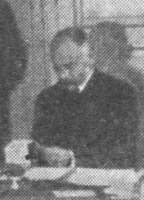 The International Committee of the North American YMCA sent its first two "ambassadors-at-large" to Europe in January
1915. After the International Committee embraced the goal of assisting POWs, the next step was negotiating with
belligerent governments to gain access to war prisoners.
The International Committee of the North American YMCA sent its first two "ambassadors-at-large" to Europe in January
1915. After the International Committee embraced the goal of assisting POWs, the next step was negotiating with
belligerent governments to gain access to war prisoners.
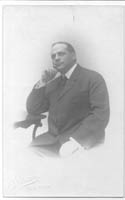 John R. Mott wrote to Paul Des Gouttes, President of the World's Alliance, on 12 January 1915, to inform the
Executive Committee that Archibald Clinton Harte would negotiate with the German government. He also wrote letters
to Christian Phildius and Emmanuel Sautter in Geneva introducing Harte and Carlisle V. Hibbard. Both Americans were
experienced in providing services to troops in battle and working overseas.
John R. Mott wrote to Paul Des Gouttes, President of the World's Alliance, on 12 January 1915, to inform the
Executive Committee that Archibald Clinton Harte would negotiate with the German government. He also wrote letters
to Christian Phildius and Emmanuel Sautter in Geneva introducing Harte and Carlisle V. Hibbard. Both Americans were
experienced in providing services to troops in battle and working overseas.
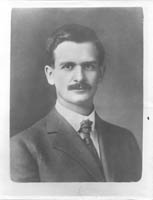 Harte was a chaplain with the U.S. Army during the Spanish-American War, and gained extensive Association experience as General Secretary of the Indian National YMCA Council (1907-1914).
Hibbard served as the Associate National Secretary for Japan from 1902 to 1914, and
provided welfare assistance to Japanese troops in Korea and Manchuria during the Russo-Japanese War.
Their goal was to persuade belligerent governments to allow American secretaries access to POW camps and to establish and develop
the Association program directed at improving the welfare of the captives.1
Harte was a chaplain with the U.S. Army during the Spanish-American War, and gained extensive Association experience as General Secretary of the Indian National YMCA Council (1907-1914).
Hibbard served as the Associate National Secretary for Japan from 1902 to 1914, and
provided welfare assistance to Japanese troops in Korea and Manchuria during the Russo-Japanese War.
Their goal was to persuade belligerent governments to allow American secretaries access to POW camps and to establish and develop
the Association program directed at improving the welfare of the captives.1
Negotiations Begin in Britain
2
 The pair arrived in England and immediately began negotiations with British officials. By the beginning of 1915,
the English YMCA had expanded the scope of its services for the British armed forces. By the end of January, the
English National Council had collected over £ 225,000 for war service operations, and the Red Triangle ranks included
five hundred salaried secretaries and two thousand volunteers.
The pair arrived in England and immediately began negotiations with British officials. By the beginning of 1915,
the English YMCA had expanded the scope of its services for the British armed forces. By the end of January, the
English National Council had collected over £ 225,000 for war service operations, and the Red Triangle ranks included
five hundred salaried secretaries and two thousand volunteers.
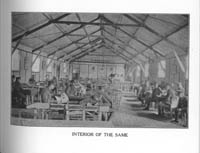 The English Association had sixty secretaries in France, seven in Egypt, and ten special secretaries in India.
Harte and Hibbard were deeply impressed by the generous treatment German prisoners received. The two Americans visited
prison camps across the British Isles, and reported that conditions and treatment were uniformly good.2
The English Association had sixty secretaries in France, seven in Egypt, and ten special secretaries in India.
Harte and Hibbard were deeply impressed by the generous treatment German prisoners received. The two Americans visited
prison camps across the British Isles, and reported that conditions and treatment were uniformly good.2
3 At this point in the war, the English National Council had not established a regular POW program for German prisoners. Instead, the English YMCA sent its regular prison secretary, F. L. Porter, to visit POW camps where he could gain admission. Porter met with the POWs, offered them small personal services, and distributed reading material. In addition, Porter provided Association services to British guards to maintain their morale.3
4 The two American secretaries soon encountered their first diplomatic obstacle. Although the War Office opened English prison camps to Harte and Hibbard for inspection, British officials would not agree on a welfare program for German prisoners on a national basis. English military authorities did not believe that extending general permits to a neutral welfare agency to organize social activities for prisoners was necessary. Instead, the War Office left the decision to admit American secretaries and establish Association services for POWs to individual camp commandants. The English National Council accepted this restriction and suggested that Harte and Hibbard develop Red Triangle services in prison camps gradually, on an ad hoc basis, to build up good will with individual prison commanders. Over time, the YMCA secretaries could demonstrate the value of a YMCA POW program to the War Office.4
5
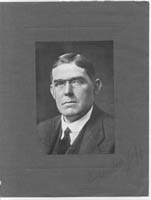 But Harte and Hibbard recognized that, in order to gain access to German prison camps, they would have to face
authorities in Berlin who would demand equal treatment for their troops imprisoned in England. When Hibbard first
inspected British prison camps, he was accompanied by Dr. Herman Rutgers, General Secretary of the Dutch Student
Christian Movement (SCM). Rutgers was one of two neutral nationals accredited by the Prisoners' Help Committee in
Germany, and had been commissioned to visit German students incarcerated in England. Rutgers' mission was to collect
information for German authorities about British war prison conditions. By gaining concessions from one government
to permit American YMCA secretaries to visit prison camps, the International Committee representatives hoped to use
diplomatic leverage to gain similar concessions from other belligerent governments for equal, or better, privileges.
This "Principle of Reciprocity" became the basis of Harte and Hibbard's negotiations, and was the key to Association
access to military prison camps. The British government then offered a compromise. Both the War Office and the Foreign
Office were sympathetic to the goals of the American YMCA, and were ready to cooperate if the Wilson Administration
extended official support to the two secretaries. If the American embassy issued a formal request, then the Foreign
Office would grant permission to establish an Association program. Harte and Hibbard conferred with the English
National Council. They agreed that POW service would be far more efficient if the YMCA received official permission
from the War Office and the Foreign Office. American secretaries could then initiate and expand social work for POWs
in cooperation with the English National Council.5
But Harte and Hibbard recognized that, in order to gain access to German prison camps, they would have to face
authorities in Berlin who would demand equal treatment for their troops imprisoned in England. When Hibbard first
inspected British prison camps, he was accompanied by Dr. Herman Rutgers, General Secretary of the Dutch Student
Christian Movement (SCM). Rutgers was one of two neutral nationals accredited by the Prisoners' Help Committee in
Germany, and had been commissioned to visit German students incarcerated in England. Rutgers' mission was to collect
information for German authorities about British war prison conditions. By gaining concessions from one government
to permit American YMCA secretaries to visit prison camps, the International Committee representatives hoped to use
diplomatic leverage to gain similar concessions from other belligerent governments for equal, or better, privileges.
This "Principle of Reciprocity" became the basis of Harte and Hibbard's negotiations, and was the key to Association
access to military prison camps. The British government then offered a compromise. Both the War Office and the Foreign
Office were sympathetic to the goals of the American YMCA, and were ready to cooperate if the Wilson Administration
extended official support to the two secretaries. If the American embassy issued a formal request, then the Foreign
Office would grant permission to establish an Association program. Harte and Hibbard conferred with the English
National Council. They agreed that POW service would be far more efficient if the YMCA received official permission
from the War Office and the Foreign Office. American secretaries could then initiate and expand social work for POWs
in cooperation with the English National Council.5
6
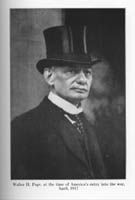 Despite this open door, the Americans were again frustrated as Ambassador Walter Hines Page refused to assume authority
for the American YMCA POW program. Page's position was surprising for several reasons. First, the embassy lacked the
staff, resources, and experience to implement an effective POW program for German prisoners in England, as reflected
in Anderson's memo of December 1914.
Despite this open door, the Americans were again frustrated as Ambassador Walter Hines Page refused to assume authority
for the American YMCA POW program. Page's position was surprising for several reasons. First, the embassy lacked the
staff, resources, and experience to implement an effective POW program for German prisoners in England, as reflected
in Anderson's memo of December 1914.
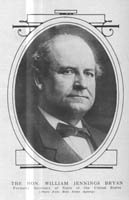 As a result, the American government would have to rely on the assistance of U.S. welfare organizations to undertake
this social work. Second, Mott and the American YMCA clearly had the full support of President Woodrow Wilson,
attested to in the papers the General Secretary carried to England in October 1914. Harte and Hibbard cabled the
International Committee in New York to gain the support of the Department of State. The General Secretary immediately
proceeded to Washington and met with State Department officials. Secretary of State William Jennings Bryan finally
extended government recognition of the American YMCA's POW work on 27 February 1915.6
As a result, the American government would have to rely on the assistance of U.S. welfare organizations to undertake
this social work. Second, Mott and the American YMCA clearly had the full support of President Woodrow Wilson,
attested to in the papers the General Secretary carried to England in October 1914. Harte and Hibbard cabled the
International Committee in New York to gain the support of the Department of State. The General Secretary immediately
proceeded to Washington and met with State Department officials. Secretary of State William Jennings Bryan finally
extended government recognition of the American YMCA's POW work on 27 February 1915.6
7 While the American secretaries waited for U.S. government sanction to gain access to British prison camps, Hibbard and Harte decided to separate and proceed on their mission in other European capitals. On 10 February 1915, Hibbard left for Paris and Harte traveled to Berlin. They recognized that negotiations with belligerent governments would be long and grueling, and agreed that they could speed up access to the prison camps by starting negotiations independently.7
Hibbard and French Negotiations
8
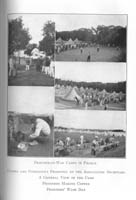 While the International Committee formulated a POW relief plan in Europe, the French YMCA made the first efforts
to begin work for German prisoners. The French army assigned J. W. Namblard, a French Association secretary, as
chaplain to the military and naval sanitary formations at Rochefort. He began work in November 1914, serving German
wounded as part of his duties. He soon began Association work for German prisoners at Rochefort-sur-Mer, both at the
depot and in the military hospital. He visited wounded and sick POWs, distributing Bibles and other books. The
chaplain was upset when he found that Germans who succumbed to their wounds or disease were buried without a religious
service. He protested, and French military authorities agreed to provide clergy for future burials. Namblard had a
limited command of German, but he nevertheless planned extensive Christmas services for the German prisoners in
December 1914. With the assistance of Pastor Terrisse, a Swiss minister, he arranged to have Christmas services and
carol singing for the POWs at Rochefort and on the island of Aix. For German prisoners in the hospital, Namblard
visited the bed-ridden and distributed oranges and games to the patients. He also arranged to have a candle lit at
the head of each bed on Christmas Eve and Christmas carols sung in each ward. At a nearby internment camp, which
housed eight hundred German and Austro-Hungarian civilians, Namblard met with some of the captives. He sought to gain access
to the prisoners, but had to work through the Ministry of the Interior, which administered the camp. By March 1915,
Namblard was working in ten prison camps in the vicinity around La Rochelle, and he had to travel approximately forty
kilometers to visit all of the facilities. He also gained access to Central Power civilians assigned to internment
facilities. For Easter 1915, Namblard arranged special religious services, and distributed German tracts and New
Testaments to thousands of prisoners. The French secretary was one of the Association's pioneers in POW relief in
France.8
While the International Committee formulated a POW relief plan in Europe, the French YMCA made the first efforts
to begin work for German prisoners. The French army assigned J. W. Namblard, a French Association secretary, as
chaplain to the military and naval sanitary formations at Rochefort. He began work in November 1914, serving German
wounded as part of his duties. He soon began Association work for German prisoners at Rochefort-sur-Mer, both at the
depot and in the military hospital. He visited wounded and sick POWs, distributing Bibles and other books. The
chaplain was upset when he found that Germans who succumbed to their wounds or disease were buried without a religious
service. He protested, and French military authorities agreed to provide clergy for future burials. Namblard had a
limited command of German, but he nevertheless planned extensive Christmas services for the German prisoners in
December 1914. With the assistance of Pastor Terrisse, a Swiss minister, he arranged to have Christmas services and
carol singing for the POWs at Rochefort and on the island of Aix. For German prisoners in the hospital, Namblard
visited the bed-ridden and distributed oranges and games to the patients. He also arranged to have a candle lit at
the head of each bed on Christmas Eve and Christmas carols sung in each ward. At a nearby internment camp, which
housed eight hundred German and Austro-Hungarian civilians, Namblard met with some of the captives. He sought to gain access
to the prisoners, but had to work through the Ministry of the Interior, which administered the camp. By March 1915,
Namblard was working in ten prison camps in the vicinity around La Rochelle, and he had to travel approximately forty
kilometers to visit all of the facilities. He also gained access to Central Power civilians assigned to internment
facilities. For Easter 1915, Namblard arranged special religious services, and distributed German tracts and New
Testaments to thousands of prisoners. The French secretary was one of the Association's pioneers in POW relief in
France.8
9
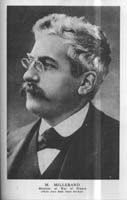 In the meantime, Hibbard arrived in France as the American YMCA's "ambassador-at-large." With the support of
Ambassador William Graves Sharp, Hibbard began negotiations with Alexander Millerand, the French Minister of
War. During initial talks, Hibbard found the French as reluctant to accept American YMCA assistance as the British
had been. At every turn, Hibbard ran into bureaucratic obstacles. Negotiations regarding military prisoners required
an agreement with the Ministry of War, while a separate set of talks with the Ministry of the Interior was necessary
to begin work with civilian internees. Sautter warned Hibbard that he did not believe that the French government
was ready to accept any foreign assistance. The one factor working in Hibbard's favor was the scarcity of French
resources available for POW relief. A few French chaplains, including Namblard, had undertaken social work on a
limited scale for POWs, but the army mobilization had emaciated the ranks of domestic social service organizations.
The manpower drain left no effective welfare agencies to meet the needs of war prisoners or soldiers in France. As
a result, the French government was willing to consider foreign offers of welfare assistance.
In the meantime, Hibbard arrived in France as the American YMCA's "ambassador-at-large." With the support of
Ambassador William Graves Sharp, Hibbard began negotiations with Alexander Millerand, the French Minister of
War. During initial talks, Hibbard found the French as reluctant to accept American YMCA assistance as the British
had been. At every turn, Hibbard ran into bureaucratic obstacles. Negotiations regarding military prisoners required
an agreement with the Ministry of War, while a separate set of talks with the Ministry of the Interior was necessary
to begin work with civilian internees. Sautter warned Hibbard that he did not believe that the French government
was ready to accept any foreign assistance. The one factor working in Hibbard's favor was the scarcity of French
resources available for POW relief. A few French chaplains, including Namblard, had undertaken social work on a
limited scale for POWs, but the army mobilization had emaciated the ranks of domestic social service organizations.
The manpower drain left no effective welfare agencies to meet the needs of war prisoners or soldiers in France. As
a result, the French government was willing to consider foreign offers of welfare assistance.
10
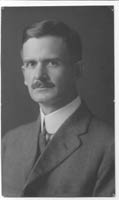 On February 23, Hibbard received conditional approval from the War Ministry to initiate limited work for prisoners.
Military officials were willing to allow American secretaries to accompany clergymen visiting prison camps to
distribute books and games and provide entertainment. The French also accepted a book exchange program through the
Stuttgart library for German prisoners. Hibbard immediately cabled the International Committee to request the
assignment of two American secretaries to begin Association POW work in France. Most importantly, the French government
promised to accept even greater American YMCA assistance if the Germans agreed to similar concessions. This understanding
marked the first application of the "Principle of Reciprocity," which became the foundation of YMCA diplomacy. One
country would accept Association social work for POWs under its control if comparable programs were established for
its imprisoned nationals.9
On February 23, Hibbard received conditional approval from the War Ministry to initiate limited work for prisoners.
Military officials were willing to allow American secretaries to accompany clergymen visiting prison camps to
distribute books and games and provide entertainment. The French also accepted a book exchange program through the
Stuttgart library for German prisoners. Hibbard immediately cabled the International Committee to request the
assignment of two American secretaries to begin Association POW work in France. Most importantly, the French government
promised to accept even greater American YMCA assistance if the Germans agreed to similar concessions. This understanding
marked the first application of the "Principle of Reciprocity," which became the foundation of YMCA diplomacy. One
country would accept Association social work for POWs under its control if comparable programs were established for
its imprisoned nationals.9
Harte Arrives in Germany
11
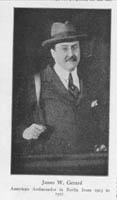 When Harte arrived in Berlin, he first met with Dr. Karl Axenfeld, Director of the Protestant Mission in Germany
and a close friend of Mott's. Axenfeld approached the Chaplain-General of the German Army regarding American YMCA
access to prison camps. Although the request was favorably received, Axenfeld did not believe that much progress
could be made at that time, because "the situation was extremely difficult and it might be necessary to remain
quiet for some time." Unperturbed, Harte cabled Phildius in Geneva for assistance. Phildius was a naturalized
Swiss citizen with important connections in Berlin (the World's Alliance General Secretary was an ideal candidate
for war prisoner diplomacy: he was German by birth and his wife was Scottish). He agreed to come to Berlin to
assist Harte in his quest. In the meantime, Harte met with Ambassador James W. Gerard, who became an enthusiastic
supporter of the American YMCA mission. Ambassador Gerard and the U.S. embassy staff inundated the Foreign Ministry
with requests to allow the American YMCA to enter POW camps to establish welfare operations for Allied prisoners.
From his work in prison camps in Germany, and through communications with U.S. embassy officials in Petrograd,
Gerard did all he could to improve the lot of Allied prisoners in Germany as well as for Central Power POWs in Russia.
The ambassador recognized that something had to be done for these men at once, and that the American YMCA was the
most effective tool for this purpose.10
When Harte arrived in Berlin, he first met with Dr. Karl Axenfeld, Director of the Protestant Mission in Germany
and a close friend of Mott's. Axenfeld approached the Chaplain-General of the German Army regarding American YMCA
access to prison camps. Although the request was favorably received, Axenfeld did not believe that much progress
could be made at that time, because "the situation was extremely difficult and it might be necessary to remain
quiet for some time." Unperturbed, Harte cabled Phildius in Geneva for assistance. Phildius was a naturalized
Swiss citizen with important connections in Berlin (the World's Alliance General Secretary was an ideal candidate
for war prisoner diplomacy: he was German by birth and his wife was Scottish). He agreed to come to Berlin to
assist Harte in his quest. In the meantime, Harte met with Ambassador James W. Gerard, who became an enthusiastic
supporter of the American YMCA mission. Ambassador Gerard and the U.S. embassy staff inundated the Foreign Ministry
with requests to allow the American YMCA to enter POW camps to establish welfare operations for Allied prisoners.
From his work in prison camps in Germany, and through communications with U.S. embassy officials in Petrograd,
Gerard did all he could to improve the lot of Allied prisoners in Germany as well as for Central Power POWs in Russia.
The ambassador recognized that something had to be done for these men at once, and that the American YMCA was the
most effective tool for this purpose.10
12
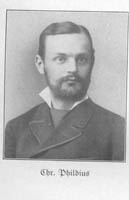 Harte also met with Dr. F. A. Speicker, president of the German Evangelical Missions' Aid. This organization,
formed in December 1914, also sought permission from the Ministry of War to provide spiritual assistance to POWs
in Germany. Reverend A. W. Schreiber, secretary of the German Evangelical Missions' Aid, readily agreed to meet
with Harte and Phildius and combine forces. Schreiber informed them that a member of the Foreign Office was
willing to promote their plan to aid war prisoners. He recommended that the German YMCA support the American
application as the best means to receive the necessary permission. The Ministry of War had extended official
recognition to the Protestant Committee for its proposed work, and Schreiber encouraged Harte to apply for similar
privileges through this organization. Schreiber arranged for Harte and Phildius to meet with representatives of
the Foreign Office. In addition, the German Red Cross agreed to cooperate with YMCA officials and intervened on
their behalf through their contacts in the Ministry of War. Dr. von Studt, Chairman of the POW Committee of the
German Red Cross, welcomed American YMCA assistance. He assigned Dr. Spencer, a German Red Cross official, to
introduce Harte and Phildius to the staff members of the War Ministry on 23 February 1915. Harte presented a plan
for relief work for Allied POWs in Germany to an attentive audience. The American secretary even enlisted the
support of the wife of the Chamberlain, whom he had met at the Protestant Mission. She called on the sister of
the Chancellor, Theobald von Bethmann-Hollweg, to solicit her support on behalf of the American YMCA, and arranged
for Harte to present his proposal to the Chancellor's staff.11
Harte also met with Dr. F. A. Speicker, president of the German Evangelical Missions' Aid. This organization,
formed in December 1914, also sought permission from the Ministry of War to provide spiritual assistance to POWs
in Germany. Reverend A. W. Schreiber, secretary of the German Evangelical Missions' Aid, readily agreed to meet
with Harte and Phildius and combine forces. Schreiber informed them that a member of the Foreign Office was
willing to promote their plan to aid war prisoners. He recommended that the German YMCA support the American
application as the best means to receive the necessary permission. The Ministry of War had extended official
recognition to the Protestant Committee for its proposed work, and Schreiber encouraged Harte to apply for similar
privileges through this organization. Schreiber arranged for Harte and Phildius to meet with representatives of
the Foreign Office. In addition, the German Red Cross agreed to cooperate with YMCA officials and intervened on
their behalf through their contacts in the Ministry of War. Dr. von Studt, Chairman of the POW Committee of the
German Red Cross, welcomed American YMCA assistance. He assigned Dr. Spencer, a German Red Cross official, to
introduce Harte and Phildius to the staff members of the War Ministry on 23 February 1915. Harte presented a plan
for relief work for Allied POWs in Germany to an attentive audience. The American secretary even enlisted the
support of the wife of the Chamberlain, whom he had met at the Protestant Mission. She called on the sister of
the Chancellor, Theobald von Bethmann-Hollweg, to solicit her support on behalf of the American YMCA, and arranged
for Harte to present his proposal to the Chancellor's staff.11
13
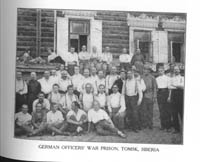 On the same day, Hibbard informed Harte that he had achieved some success in persuading the French Ministry of
War to consider allowing American YMCA secretaries to provide Association services to German prisoners if they
could be assured that German authorities would make similar concessions for French POWs in Germany. In addition,
the Department of State cabled the Foreign Ministry in support of Harte's proposal, placing additional official
weight behind his plan. Most importantly, the German public had serious concerns regarding the treatment of their
POWs in Russia, and Ministry of War officials viewed the American YMCA as a potential vehicle to help improve the
lot of German prisoners. Bombarded with requests from the German YMCA, relief organizations, Gerard and the State
Department, as well as Harte and Phildius, and coupled with the provisional concession from the French government,
the German Ministry of War decided to approve Harte's proposal. On March 6, Schreiber received a note from the War
Ministry indicating that "the War Ministry begs to inform you that it can only welcome the offer of the most
commendable cooperation of the Young Men's Christian Associations, and that it will render them every assistance
in reaching their aim speedily."12 The response of the
German government was far more generous than the tentative receptions of French or British officials. This was the
first concrete result of the Association's POW diplomacy, and a critical first step in gaining access to war prisoners.
Now the question was where the American YMCA should begin POW relief operations.13
On the same day, Hibbard informed Harte that he had achieved some success in persuading the French Ministry of
War to consider allowing American YMCA secretaries to provide Association services to German prisoners if they
could be assured that German authorities would make similar concessions for French POWs in Germany. In addition,
the Department of State cabled the Foreign Ministry in support of Harte's proposal, placing additional official
weight behind his plan. Most importantly, the German public had serious concerns regarding the treatment of their
POWs in Russia, and Ministry of War officials viewed the American YMCA as a potential vehicle to help improve the
lot of German prisoners. Bombarded with requests from the German YMCA, relief organizations, Gerard and the State
Department, as well as Harte and Phildius, and coupled with the provisional concession from the French government,
the German Ministry of War decided to approve Harte's proposal. On March 6, Schreiber received a note from the War
Ministry indicating that "the War Ministry begs to inform you that it can only welcome the offer of the most
commendable cooperation of the Young Men's Christian Associations, and that it will render them every assistance
in reaching their aim speedily."12 The response of the
German government was far more generous than the tentative receptions of French or British officials. This was the
first concrete result of the Association's POW diplomacy, and a critical first step in gaining access to war prisoners.
Now the question was where the American YMCA should begin POW relief operations.13
14
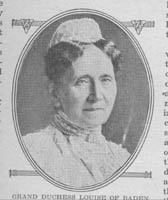 Preliminary relief work for Allied POWs had begun by early 1915. French-speaking German clergymen gained
permission to visit prison camps. These ministers described the deep spiritual needs in the camps. One pastor
had two thousand men attend an open-air service, even though there were only two hundred Protestant prisoners in the camp.
The ministers rapidly ran out of pamphlets and Gospels, and they believed that a true religious revival could
be fostered in prison camps. In the Berlin area, a large number of French priests were incarcerated as war
prisoners. They reported that the war had stirred up deep religious needs among the "neglected sons of the
French republic" and called for assistance. A French pastor who ministered to a congregation in Berlin visited
a prison camp twice weekly. Harte admired his industry as he distributed four thousand French Gospels, trousers, warm
shirts, apples, chocolate, and tobacco. The funds for this charity were provided by personal friends and French
congregations in Berlin and Basel. He also organized an Association (and a choir) in this prison, and knew of
Associations for French POWs in two other prison camps. The American YMCA could take advantage of many clergy
that were willing to distribute books and comforts to war prisoners. In addition, Association secretaries from
neutral countries tried to provide assistance to Allied prisoners in Germany. A Swiss Student Secretary traveled
to Germany in February 1915 and was received by Grand Duchess Luise of Baden. They visited a lazaret in Carlsruhe,
where the German Red Cross was caring for German wounded.14
Preliminary relief work for Allied POWs had begun by early 1915. French-speaking German clergymen gained
permission to visit prison camps. These ministers described the deep spiritual needs in the camps. One pastor
had two thousand men attend an open-air service, even though there were only two hundred Protestant prisoners in the camp.
The ministers rapidly ran out of pamphlets and Gospels, and they believed that a true religious revival could
be fostered in prison camps. In the Berlin area, a large number of French priests were incarcerated as war
prisoners. They reported that the war had stirred up deep religious needs among the "neglected sons of the
French republic" and called for assistance. A French pastor who ministered to a congregation in Berlin visited
a prison camp twice weekly. Harte admired his industry as he distributed four thousand French Gospels, trousers, warm
shirts, apples, chocolate, and tobacco. The funds for this charity were provided by personal friends and French
congregations in Berlin and Basel. He also organized an Association (and a choir) in this prison, and knew of
Associations for French POWs in two other prison camps. The American YMCA could take advantage of many clergy
that were willing to distribute books and comforts to war prisoners. In addition, Association secretaries from
neutral countries tried to provide assistance to Allied prisoners in Germany. A Swiss Student Secretary traveled
to Germany in February 1915 and was received by Grand Duchess Luise of Baden. They visited a lazaret in Carlsruhe,
where the German Red Cross was caring for German wounded.14
15
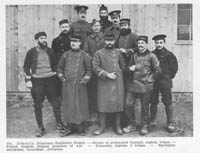 Before Harte received permission from the Ministry of War to begin Association work in prison facilities, he visited
some of the POW camps in Germany. Harte and Phildius toured the Soldatenheim at Döberitz on March 3.
They met some Russian POWs who had jobs tending the garden at the center. The president of the Association
offered to introduce the American secretaries to the general in command of the POW camp system in Prussia,
and encouraged the American YMCA to erect huts in the prison camp. The six thousand British POWs, over four thousand Russian
prisoners, and two thousand French POWs in this camp would benefit from Red Triangle services. Harte and Phildius provided
some spiritual relief for the POWs at the camp. They conducted funeral services for two British prisoners, and
promised to contact their families. The next day, they visited the British civilian prisoners at Ruhleben, which
had been a horseracing track before the war. The two secretaries found the camp well organized, with an extensive
night school, a choir that performed at weekly concerts and Sunday services, and a library of 1,500 volumes.
Before Harte received permission from the Ministry of War to begin Association work in prison facilities, he visited
some of the POW camps in Germany. Harte and Phildius toured the Soldatenheim at Döberitz on March 3.
They met some Russian POWs who had jobs tending the garden at the center. The president of the Association
offered to introduce the American secretaries to the general in command of the POW camp system in Prussia,
and encouraged the American YMCA to erect huts in the prison camp. The six thousand British POWs, over four thousand Russian
prisoners, and two thousand French POWs in this camp would benefit from Red Triangle services. Harte and Phildius provided
some spiritual relief for the POWs at the camp. They conducted funeral services for two British prisoners, and
promised to contact their families. The next day, they visited the British civilian prisoners at Ruhleben, which
had been a horseracing track before the war. The two secretaries found the camp well organized, with an extensive
night school, a choir that performed at weekly concerts and Sunday services, and a library of 1,500 volumes.
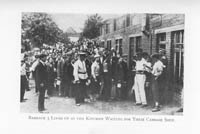 The camp represented a mixture of every class in society, from nobility and wealth to common servants. Many
POWs had money, and those without funds received five Marks each week from the British government through the
U.S. embassy. The prisoners also had sufficient clothing; most requests were for tobacco. Unlike military war
prisoners, civilian internees were shocked by their unexpected incarceration in early August 1914. The British
civilians expected the war to end within a few months, and as the war dragged on, their mental and spiritual
fortitude dwindled. The prisoners also chafed under the poor living conditions (men lived six to a horse stall,
or by the hundreds in the hay lofts). Even more grating was the German insistence at the beginning of the war
on rigid military discipline for internees, which soured relations between the guards and the prisoners. English
internees desperately needed the services provided by the YMCA. The POWs were enthusiastic about Harte's visit,
and informed him that they were interested in applying for an Association building. Ruhleben was clearly a field
of future Red Triangle work. Harte concluded that, for the Association to succeed in POW relief work, the
International Committee would have to send at least one experienced secretary who spoke French, one who spoke
Russian, and one who could supervise office work and bookkeeping requirements.15
The camp represented a mixture of every class in society, from nobility and wealth to common servants. Many
POWs had money, and those without funds received five Marks each week from the British government through the
U.S. embassy. The prisoners also had sufficient clothing; most requests were for tobacco. Unlike military war
prisoners, civilian internees were shocked by their unexpected incarceration in early August 1914. The British
civilians expected the war to end within a few months, and as the war dragged on, their mental and spiritual
fortitude dwindled. The prisoners also chafed under the poor living conditions (men lived six to a horse stall,
or by the hundreds in the hay lofts). Even more grating was the German insistence at the beginning of the war
on rigid military discipline for internees, which soured relations between the guards and the prisoners. English
internees desperately needed the services provided by the YMCA. The POWs were enthusiastic about Harte's visit,
and informed him that they were interested in applying for an Association building. Ruhleben was clearly a field
of future Red Triangle work. Harte concluded that, for the Association to succeed in POW relief work, the
International Committee would have to send at least one experienced secretary who spoke French, one who spoke
Russian, and one who could supervise office work and bookkeeping requirements.15
16
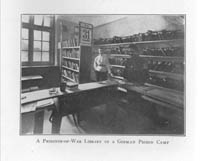 On the evening of March 4, Harte and Phildius had dinner with Pastor Kieser, Franz Spemann, and Herr Sudreitzky
of the German Christian Student Movement (Deutsche Christlicher Studenten Vereine, or DCSV). They were
joined by two Swedish missionaries who were interested in working with Greek POWs in Germany. Sudreitzky had
already begun relief work among Russian prisoners. Kieser, Spemann, and Gerhard Niedermeyer (National Secretary
of the DCSV) were very enthusiastic about conducting welfare work for students in the war prisoner population.
They believed that YMCA work for these POWs would facilitate friendlier post-war relations. Spemann offered his
services to the American YMCA for POW work if the International Committee paid half of his salary. Kieser was
willing to work with Belgian student POWs for six months before he became the Home Secretary of the Basel Mission.
By this time, the DCSV was already engaged in work with Allied prisoners in Germany. The DCSV had received permission
from the Ministry of War to distribute New Testaments to Russian prisoners. Pastor Schrenk and three assistants
distributed over 250,000 Testaments. Schrenk was a member of the Relief Committee for the Pastoral Work in German
Prisoners' Camps, and was in a unique position to promote POW relief. The DCSV assigned three secretaries to assist
Schrenk and paid their salaries. They would focus on developing social work as part of the relief effort in prison
camps.
On the evening of March 4, Harte and Phildius had dinner with Pastor Kieser, Franz Spemann, and Herr Sudreitzky
of the German Christian Student Movement (Deutsche Christlicher Studenten Vereine, or DCSV). They were
joined by two Swedish missionaries who were interested in working with Greek POWs in Germany. Sudreitzky had
already begun relief work among Russian prisoners. Kieser, Spemann, and Gerhard Niedermeyer (National Secretary
of the DCSV) were very enthusiastic about conducting welfare work for students in the war prisoner population.
They believed that YMCA work for these POWs would facilitate friendlier post-war relations. Spemann offered his
services to the American YMCA for POW work if the International Committee paid half of his salary. Kieser was
willing to work with Belgian student POWs for six months before he became the Home Secretary of the Basel Mission.
By this time, the DCSV was already engaged in work with Allied prisoners in Germany. The DCSV had received permission
from the Ministry of War to distribute New Testaments to Russian prisoners. Pastor Schrenk and three assistants
distributed over 250,000 Testaments. Schrenk was a member of the Relief Committee for the Pastoral Work in German
Prisoners' Camps, and was in a unique position to promote POW relief. The DCSV assigned three secretaries to assist
Schrenk and paid their salaries. They would focus on developing social work as part of the relief effort in prison
camps.
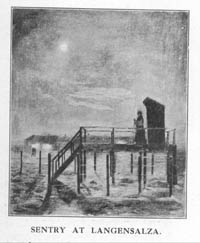 The DCSV recognized that thousands of prisoners did not receive parcels from home and were destitute. They needed
additional food and clothing, and the organization hoped to help these men. In addition, the DCSV sought to
establish libraries for German guards detailed to POW camps. Guards faced the same boredom as prisoners, and
this program was met with great national sympathy and support. Providing books to guards also gave the DCSV
another avenue for gaining access to prison camps. While the DCSV was eager to undertake these social programs
(building YMCA halls, equipping orchestras and libraries, and compensating German secretaries), the organization
faced financial handicaps. The fiscal strength of the nation was directed toward the economic maintenance of
Germany and the relief of German soldiers in the field. As a result, the DCSV looked to the American YMCA for
financial assistance to support this program. Mott provided $5,000 in May 1915, and continued to extend funds
needed to maintain German YMCA social work until February 1917. Members of the German YMCA were aware of the
problems that POWs faced, and were interested in extending as much assistance as possible.16
The DCSV recognized that thousands of prisoners did not receive parcels from home and were destitute. They needed
additional food and clothing, and the organization hoped to help these men. In addition, the DCSV sought to
establish libraries for German guards detailed to POW camps. Guards faced the same boredom as prisoners, and
this program was met with great national sympathy and support. Providing books to guards also gave the DCSV
another avenue for gaining access to prison camps. While the DCSV was eager to undertake these social programs
(building YMCA halls, equipping orchestras and libraries, and compensating German secretaries), the organization
faced financial handicaps. The fiscal strength of the nation was directed toward the economic maintenance of
Germany and the relief of German soldiers in the field. As a result, the DCSV looked to the American YMCA for
financial assistance to support this program. Mott provided $5,000 in May 1915, and continued to extend funds
needed to maintain German YMCA social work until February 1917. Members of the German YMCA were aware of the
problems that POWs faced, and were interested in extending as much assistance as possible.16
17
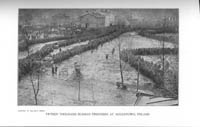 The American secretary took an optimistic view of the work ahead and sought to build up a strong relationship with
German authorities. He wrote on February 23 that, "all prisoners here are treated justly, and there is no foundation
at all for the dreadful stories that have been circulated in other lands." By February 1915, the Germans and
Austro-Hungarians held approximately one million Allied prisoners, and the problem of providing relief services to
so great a number was "vast and complicated." The YMCA was in a unique position to provide assistance to these
The American secretary took an optimistic view of the work ahead and sought to build up a strong relationship with
German authorities. He wrote on February 23 that, "all prisoners here are treated justly, and there is no foundation
at all for the dreadful stories that have been circulated in other lands." By February 1915, the Germans and
Austro-Hungarians held approximately one million Allied prisoners, and the problem of providing relief services to
so great a number was "vast and complicated." The YMCA was in a unique position to provide assistance to these
… young men in a trying position. In a military prison, character must either grow in strength or disintegrate. There was no question, if the Association could get permission, to render a fraternal service to help in character-building. The sure way to help prisoners-of-war was to build up their faith and occupy their time with work, study, and recreation.17
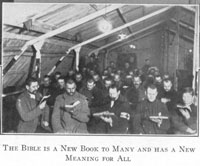 Harte also noted that the development of American YMCA work in Germany faced serious constraints. Space, in the
form of rooms and huts, was extremely limited in prison camps. The lack of adequate experienced personnel was an
even a greater problem. Workers trained in social service were needed to provide personal service to these prisoners.
Reading matter, especially light literature that made no reference to the war, would be very useful. But most
importantly, at least for the YMCA, the POWs needed religious literature, including English, French, and Russian
Bibles and Testaments, which could be provided by the American Bible Society and the World's Sunday School
Association.18
Harte also noted that the development of American YMCA work in Germany faced serious constraints. Space, in the
form of rooms and huts, was extremely limited in prison camps. The lack of adequate experienced personnel was an
even a greater problem. Workers trained in social service were needed to provide personal service to these prisoners.
Reading matter, especially light literature that made no reference to the war, would be very useful. But most
importantly, at least for the YMCA, the POWs needed religious literature, including English, French, and Russian
Bibles and Testaments, which could be provided by the American Bible Society and the World's Sunday School
Association.18
18
 On March 16, Harte cabled the International Committee about the conference regarding Association work in Germany.
The Ministry of War recommended that work should begin at the camp in Göttingen, which held approximately
seven thousand Russian, British, French, Belgian, and civilian prisoners, and in Altengrabow, where over twenty thousand Russian,
French, Belgian, British, and civilian POWs were incarcerated. He requested salaries for three German assistants
who could speak Russian, French, and English, respectively. Harte also asked Mott to inform the British, French,
and Russian governments about this breakthrough in POW diplomacy. He had already contacted Gerard, who would forward
a report to the U.S. State Department. In a letter,
On March 16, Harte cabled the International Committee about the conference regarding Association work in Germany.
The Ministry of War recommended that work should begin at the camp in Göttingen, which held approximately
seven thousand Russian, British, French, Belgian, and civilian prisoners, and in Altengrabow, where over twenty thousand Russian,
French, Belgian, British, and civilian POWs were incarcerated. He requested salaries for three German assistants
who could speak Russian, French, and English, respectively. Harte also asked Mott to inform the British, French,
and Russian governments about this breakthrough in POW diplomacy. He had already contacted Gerard, who would forward
a report to the U.S. State Department. In a letter,
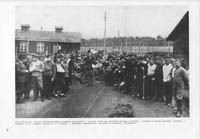 Harte followed up with more detailed information. Phildius and he planned to build two Association huts in
Göttingen and Altengrabow; they would also prepare demonstration pilot projects for German authorities by
organizing and supporting YMCA committees in these camps. In addition, Harte had enlisted the services of the
former secretary of the German YMCA in London, the former secretary of the German Association in St. Petersburg,
and a German secretary from the Student Christian Federation.19
Harte followed up with more detailed information. Phildius and he planned to build two Association huts in
Göttingen and Altengrabow; they would also prepare demonstration pilot projects for German authorities by
organizing and supporting YMCA committees in these camps. In addition, Harte had enlisted the services of the
former secretary of the German YMCA in London, the former secretary of the German Association in St. Petersburg,
and a German secretary from the Student Christian Federation.19
19
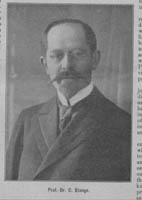 Harte and Phildius left Berlin on March 14 to visit the prison camp at Göttingen. They were accompanied
by Captain W. von Lübbers, a representative assigned by the Ministry of War as a military escort. They
arrived at the camp on March 22 and conducted an inspection. At a meeting attended by von Lübbers, Colonel
Bogen (the camp commandant), Professor Carl Stange of the University of Göttingen, Schreiber, Phildius,
and Harte, the delegates studied the problem of providing aid to the POWs. Harte reported that German officials
were very sympathetic to the Association's plan, and that Bogen was interested in every phase of welfare work.
Stange was eager to serve the POWs, and had prepared the ground for the Association by offering weekly lectures,
publishing a magazine fortnightly in French, and starting a small library.
Harte and Phildius left Berlin on March 14 to visit the prison camp at Göttingen. They were accompanied
by Captain W. von Lübbers, a representative assigned by the Ministry of War as a military escort. They
arrived at the camp on March 22 and conducted an inspection. At a meeting attended by von Lübbers, Colonel
Bogen (the camp commandant), Professor Carl Stange of the University of Göttingen, Schreiber, Phildius,
and Harte, the delegates studied the problem of providing aid to the POWs. Harte reported that German officials
were very sympathetic to the Association's plan, and that Bogen was interested in every phase of welfare work.
Stange was eager to serve the POWs, and had prepared the ground for the Association by offering weekly lectures,
publishing a magazine fortnightly in French, and starting a small library.
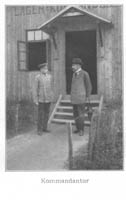 The commandant provided a choice site for a YMCA hut, and Harte hoped to open the building within two weeks.
Von Lübbers informed Harte of his report to his superiors regarding recent developments. All the German
officials were impressed with the Association secretaries and only wished that the work had begun earlier; the
American YMCA was assured that it could rely on all possible support from the Ministry of War. In letters dated
March 24 and 30, Harte described conditions at Göttingen. He believed that the Ministry of War was "more
than keeping international agreements," and that they sought to help POWs, constantly making improvements. The
barracks at Göttingen were the best he had seen to date. The camp had
bathing and laundry facilities, as well as repair shops for clothing and shoes. The hospital was clean and
attractive, with an adequate staff of doctors and nurses. Prisoners received regulation issues of clothing and
blankets, although there was always a need for socks and shoes. Rations were the same in Germany as he had observed
in England, although "I knew I would be sorry to have the war prison fare every day for a week."20
The commandant provided a choice site for a YMCA hut, and Harte hoped to open the building within two weeks.
Von Lübbers informed Harte of his report to his superiors regarding recent developments. All the German
officials were impressed with the Association secretaries and only wished that the work had begun earlier; the
American YMCA was assured that it could rely on all possible support from the Ministry of War. In letters dated
March 24 and 30, Harte described conditions at Göttingen. He believed that the Ministry of War was "more
than keeping international agreements," and that they sought to help POWs, constantly making improvements. The
barracks at Göttingen were the best he had seen to date. The camp had
bathing and laundry facilities, as well as repair shops for clothing and shoes. The hospital was clean and
attractive, with an adequate staff of doctors and nurses. Prisoners received regulation issues of clothing and
blankets, although there was always a need for socks and shoes. Rations were the same in Germany as he had observed
in England, although "I knew I would be sorry to have the war prison fare every day for a week."20
20
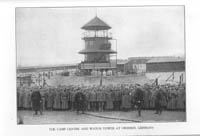 Three days later, the two Association secretaries, Schreiber, and von Lübbers traveled to Crossen-an-der-Oder
to inspect that prison camp. For an undisclosed reason, the Germans decided to develop this camp instead of Altengrabow.
They were met by the commandant and his staff, who were quite proud of their camp. Harte was impressed with the reception
he received from German authorities. The Association secretaries inspected the kitchen and had a lunch of broth and
sandwiches. They also toured the camp's bathing and fumigating plant; camp officers described how the Russian POWs
initially refused to enter the bathing facility, and many tried to escape. After they endured the process, they had
learned to look forward to weekly cleaning. The camp also featured a wood-working department where prisoners could
build small toys, inlaid chests, chairs, and camp furniture. The camp fire brigade demonstrated an exercise for the
visitors. These activities gave prisoners physical and mental stimulation while providing important services for the
camp. In addition, the Germans provided a church for the POWs based on a Russian design.21
Three days later, the two Association secretaries, Schreiber, and von Lübbers traveled to Crossen-an-der-Oder
to inspect that prison camp. For an undisclosed reason, the Germans decided to develop this camp instead of Altengrabow.
They were met by the commandant and his staff, who were quite proud of their camp. Harte was impressed with the reception
he received from German authorities. The Association secretaries inspected the kitchen and had a lunch of broth and
sandwiches. They also toured the camp's bathing and fumigating plant; camp officers described how the Russian POWs
initially refused to enter the bathing facility, and many tried to escape. After they endured the process, they had
learned to look forward to weekly cleaning. The camp also featured a wood-working department where prisoners could
build small toys, inlaid chests, chairs, and camp furniture. The camp fire brigade demonstrated an exercise for the
visitors. These activities gave prisoners physical and mental stimulation while providing important services for the
camp. In addition, the Germans provided a church for the POWs based on a Russian design.21
21
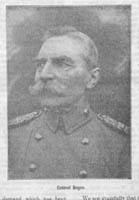 On April 8, Harte reported that the camp commandants at Göttingen and Crossen had received him most cordially
and had given him the freedom of the camps. They were "scientifically studying the improvement of conditions,
physically, mentally, and spiritually." Harte attended their meetings and was allowed to participate in discussions.
He wrote the next day:
On April 8, Harte reported that the camp commandants at Göttingen and Crossen had received him most cordially
and had given him the freedom of the camps. They were "scientifically studying the improvement of conditions,
physically, mentally, and spiritually." Harte attended their meetings and was allowed to participate in discussions.
He wrote the next day:
Everywhere I go I find the prison officials courteous. Many go out of their way to help us. Throughout official circles the sentiment is to do for war prisoners all that they can. If the news concerning the treatment of war prisoners in other countries continues to be good, we will advance rapidly.22
The American secretary described the essence of the Principle of Reciprocity. By gaining access to German prison camps to provide welfare services to Allied prisoners, he hoped to persuade the British and French governments (and other belligerent states in the future) to open their prison camps to Red Triangle secretaries so that German POWs could benefit from the Association program.23
22
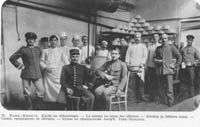 Harte also traveled to Hannoverisch-Münden on March 29 and found the POWs in need of a reading room,
prayer room, and lecture hall. The camp commandant heartily encouraged Association work, and urged Harte to
begin as soon as possible. The American secretary concluded that service in this camp was:
Harte also traveled to Hannoverisch-Münden on March 29 and found the POWs in need of a reading room,
prayer room, and lecture hall. The camp commandant heartily encouraged Association work, and urged Harte to
begin as soon as possible. The American secretary concluded that service in this camp was:
… a remarkable opportunity to serve Russia as well as other lands now at war. If we minister to Russians in the war prisons here it must not only give us access to Germans in Russia, but it must be of great service to the YMCA in Russia in future years … I believe we are having a remarkable opportunity today.24
Encouraged by his progress in Germany, Harte realized that the next step was to provide services to German POWs in Russia, invoking the Principle of Reciprocity. The establishment of Red Triangle welfare work in Russia could be used to request even greater concessions in Germany from the Ministry of War. In addition, the expansion of POW work to Russia would help to build up the Russian YMCA (Miyak) and prepare the organization for post-war growth. Harte planned to discuss expanding Association POW work to Russia with Ambassador Gerard and sought embassy support.25
23
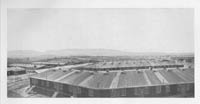 By the middle of April 1915, Harte had visited additional prison camps near Cassel and Sennelager. While visiting
these camps, Harte distributed money to non-commissioned officers for the purchase of articles and goods needed by
the POWs. At Cassel, the sergeant in charge purchased barber instruments, soap, blacking, and brushes for use by
POWs who could not afford them.
By the middle of April 1915, Harte had visited additional prison camps near Cassel and Sennelager. While visiting
these camps, Harte distributed money to non-commissioned officers for the purchase of articles and goods needed by
the POWs. At Cassel, the sergeant in charge purchased barber instruments, soap, blacking, and brushes for use by
POWs who could not afford them.
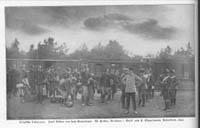 In addition, Harte arranged for the distribution of Gospels among the men. After the inspections, he issued similar
optimistic reports, which became the target of criticism after the war. But Harte was working under trying circumstances.
Harte sent copies of his correspondence to the International Committee in New York, various U.S. embassies, and the
German government to avoid any suspicions regarding his work.
In addition, Harte arranged for the distribution of Gospels among the men. After the inspections, he issued similar
optimistic reports, which became the target of criticism after the war. But Harte was working under trying circumstances.
Harte sent copies of his correspondence to the International Committee in New York, various U.S. embassies, and the
German government to avoid any suspicions regarding his work.
24
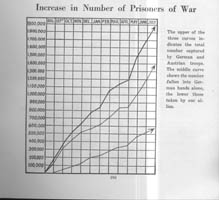 His reports were tactful and diplomatic as he tried to establish a working relationship with the German government.
Harte recognized that unfavorable reports would close German prison camps to the American YMCA, cutting off essential
services to Allied prisoners. In addition, his views reflected the optimistic nature of Association secretaries, who
tended to view challenges as opportunities. Harte's descriptions of the humane attitude of German officials and their
promotion of the POW welfare program were followed up by active policy implementation. The American secretary also
recognized the strain Allied POWs were placing on the German economy. By April 1915, the Germans officially held
812,800 prisoners in approximately one hundred major prison camps; there were more Allied POWs than the peacetime footing of
the German Army (806,026 officers and men in
His reports were tactful and diplomatic as he tried to establish a working relationship with the German government.
Harte recognized that unfavorable reports would close German prison camps to the American YMCA, cutting off essential
services to Allied prisoners. In addition, his views reflected the optimistic nature of Association secretaries, who
tended to view challenges as opportunities. Harte's descriptions of the humane attitude of German officials and their
promotion of the POW welfare program were followed up by active policy implementation. The American secretary also
recognized the strain Allied POWs were placing on the German economy. By April 1915, the Germans officially held
812,800 prisoners in approximately one hundred major prison camps; there were more Allied POWs than the peacetime footing of
the German Army (806,026 officers and men in
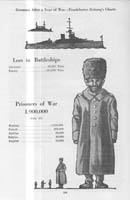 1914). To administer support for this body of captives, the Prisoner's Commission of the Ministry of War employed
over six hundred men in headquarters work alone at a cost of 1.5 million Marks a day. Harte remarked, "To house, feed,
clothe, and watch over 800,000 is a considerable task. I wonder Germany is doing it as well as she
does."26 The American secretary pointed out that the Germans focused on
improving sanitary conditions in the prison camps. Russian prisoners arrived at POW camps infested with vermin and
medical authorities were dedicated to preventing further outbreaks of typhoid. He also acknowledged that even if
the Germans exceeded the requirements of the Hague Conventions, there would still be a dire need for the type of
relief work provided by the YMCA.27
1914). To administer support for this body of captives, the Prisoner's Commission of the Ministry of War employed
over six hundred men in headquarters work alone at a cost of 1.5 million Marks a day. Harte remarked, "To house, feed,
clothe, and watch over 800,000 is a considerable task. I wonder Germany is doing it as well as she
does."26 The American secretary pointed out that the Germans focused on
improving sanitary conditions in the prison camps. Russian prisoners arrived at POW camps infested with vermin and
medical authorities were dedicated to preventing further outbreaks of typhoid. He also acknowledged that even if
the Germans exceeded the requirements of the Hague Conventions, there would still be a dire need for the type of
relief work provided by the YMCA.27
25
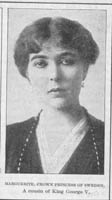 By mid-March 1915, Harte had formulated a general plan for undertaking POW work in Germany. He knew that American
secretaries could provide an invaluable service to Allied prisoners in Germany, but he also recognized that the
International Committee would be unlikely to provide enough men to establish services in all of Germany's prison
camps. Instead, he recommended that a limited number of Red Triangle workers form executive committees from among
the POWs to manage the welfare work. The American Association could then concentrate on funding and equipping huts
with exchange libraries, small organs, gymnastic and sports equipment, testaments and psalms, school textbooks, and
hymn books. The American secretary also discussed the issue of clothing with von Lübbers. Crown Princess Margaret
of Sweden had already begun organizing circles to provide clothing for Allied prisoners in Germany, and was willing to
work with the American YMCA to distribute goods to the needy.28
By mid-March 1915, Harte had formulated a general plan for undertaking POW work in Germany. He knew that American
secretaries could provide an invaluable service to Allied prisoners in Germany, but he also recognized that the
International Committee would be unlikely to provide enough men to establish services in all of Germany's prison
camps. Instead, he recommended that a limited number of Red Triangle workers form executive committees from among
the POWs to manage the welfare work. The American Association could then concentrate on funding and equipping huts
with exchange libraries, small organs, gymnastic and sports equipment, testaments and psalms, school textbooks, and
hymn books. The American secretary also discussed the issue of clothing with von Lübbers. Crown Princess Margaret
of Sweden had already begun organizing circles to provide clothing for Allied prisoners in Germany, and was willing to
work with the American YMCA to distribute goods to the needy.28
The French Government's Response
26
 While Harte worked in Germany, Hibbard inspected prison camp conditions in France. Although he found the physical
conditions excellent, the American secretary determined that German POWs needed services that the French government
could not provide. Many interned civilians were destitute, and French authorities issued appeals for books and games
for the internees. The French had placed civilians in many small camps scattered across the country, so that Hibbard
concluded that the establishment of huts would not be practical. Instead, the American secretary recommended that the
Association distribute circulating libraries, games, and a traveling Field Secretary to support a Red Triangle program.
These prisoners did not have access to current periodicals or books, and circulating libraries would provide them with
an important means of diversion. Hibbard also found that Central Power POWs in military prisons also were in great need
of Association social work. He believed that the establishment of YMCA huts would be far more beneficial for these
unfortunates, especially in the larger prison camps. The men had access to only limited correspondence; they could send
only two postcards and one letter per month, and French censors could not handle additional correspondence. As a result,
Hibbard recommended that the YMCA begin distributing libraries and games among the military POWs as well.29
While Harte worked in Germany, Hibbard inspected prison camp conditions in France. Although he found the physical
conditions excellent, the American secretary determined that German POWs needed services that the French government
could not provide. Many interned civilians were destitute, and French authorities issued appeals for books and games
for the internees. The French had placed civilians in many small camps scattered across the country, so that Hibbard
concluded that the establishment of huts would not be practical. Instead, the American secretary recommended that the
Association distribute circulating libraries, games, and a traveling Field Secretary to support a Red Triangle program.
These prisoners did not have access to current periodicals or books, and circulating libraries would provide them with
an important means of diversion. Hibbard also found that Central Power POWs in military prisons also were in great need
of Association social work. He believed that the establishment of YMCA huts would be far more beneficial for these
unfortunates, especially in the larger prison camps. The men had access to only limited correspondence; they could send
only two postcards and one letter per month, and French censors could not handle additional correspondence. As a result,
Hibbard recommended that the YMCA begin distributing libraries and games among the military POWs as well.29
27
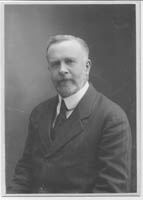 The World's Alliance of YMCAs also assisted Hibbard in developing POW work in France. The Swiss National YMCA Committee
sent Pastor Lauterbach, a clergyman from Berne, to Paris to conduct evangelistic work among German prisoners. The German
government approved Lauterbach for this work. Lauterbach had connections with Student Associations, and he was further
suited for this work because he spoke French, German, and English. Sautter also requested additional secretaries for POW
work from the World's Alliance. Pastor W. Gottsched, who responded to Sautter's telegram, considered the call a "divine
commission." Gottsched was well received by the Ministry of War because of his strong French sympathies, although he
proved his ability to work with the German POWs. With the assistance of Harte, Gottsched improved relations with both
the War Ministry and Ambassador Sharp's staff and obtained greater access to prison facilities. At this point, Hibbard
hoped to coordinate the activities between the French chaplains, the Swiss secretaries, and the American Red Triangle
workers to reduce duplicated effort and avoid dangerous errors, but important problems had to be addressed before the
work could expand. With the cooperation of Raoul Allier, leader of the French Federation of Christian Students and
ardent supporter of French prisoners of war in Germany, the French YMCA obtained four thousand books on a variety of subjects
from several large publishers in Paris for French prisoners in Germany. The books were shipped via the World's Committee
in Geneva, and sent under the cover of the Red Cross to POWs incarcerated in German prison camps. The American YMCA
defrayed the costs of purchase and shipment of these books, and each book was stamped with the American YMCA
emblem.30
The World's Alliance of YMCAs also assisted Hibbard in developing POW work in France. The Swiss National YMCA Committee
sent Pastor Lauterbach, a clergyman from Berne, to Paris to conduct evangelistic work among German prisoners. The German
government approved Lauterbach for this work. Lauterbach had connections with Student Associations, and he was further
suited for this work because he spoke French, German, and English. Sautter also requested additional secretaries for POW
work from the World's Alliance. Pastor W. Gottsched, who responded to Sautter's telegram, considered the call a "divine
commission." Gottsched was well received by the Ministry of War because of his strong French sympathies, although he
proved his ability to work with the German POWs. With the assistance of Harte, Gottsched improved relations with both
the War Ministry and Ambassador Sharp's staff and obtained greater access to prison facilities. At this point, Hibbard
hoped to coordinate the activities between the French chaplains, the Swiss secretaries, and the American Red Triangle
workers to reduce duplicated effort and avoid dangerous errors, but important problems had to be addressed before the
work could expand. With the cooperation of Raoul Allier, leader of the French Federation of Christian Students and
ardent supporter of French prisoners of war in Germany, the French YMCA obtained four thousand books on a variety of subjects
from several large publishers in Paris for French prisoners in Germany. The books were shipped via the World's Committee
in Geneva, and sent under the cover of the Red Cross to POWs incarcerated in German prison camps. The American YMCA
defrayed the costs of purchase and shipment of these books, and each book was stamped with the American YMCA
emblem.30
28
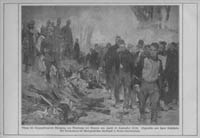 In the meantime, Harte had received additional concessions from the German Ministry of War in early March 1915.
With this news, Hibbard put pressure on the French government to fulfill the quid pro quo clause of reciprocal
treatment in the February 23 agreement. French officials, however, delayed a decision on further concessions because
of widespread dissatisfaction among the French public that prison conditions in Germany were far worse than for Central
Power prisoners in France. The basis of reciprocity rested on the concept that it "will … be possible to do
Association work for prisoners in any country only so far as we can give assurances that the enemy country makes
similar concessions."31
In the meantime, Harte had received additional concessions from the German Ministry of War in early March 1915.
With this news, Hibbard put pressure on the French government to fulfill the quid pro quo clause of reciprocal
treatment in the February 23 agreement. French officials, however, delayed a decision on further concessions because
of widespread dissatisfaction among the French public that prison conditions in Germany were far worse than for Central
Power prisoners in France. The basis of reciprocity rested on the concept that it "will … be possible to do
Association work for prisoners in any country only so far as we can give assurances that the enemy country makes
similar concessions."31
29
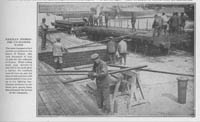 The chief difficulty with reciprocity was that most people believed that the prisoners under their care were treated
better than their countrymen held in enemy territory. French authorities were not disposed to facilitate concessions
to POWs in their system, even if the German government liberalized access to the American YMCA. While the Germans might
concede some advantages to French prisoners, this act compensated only in a very small degree for the material privations
which the Allied prisoners suffered in comparison with German POWs incarcerated in France.32
The chief difficulty with reciprocity was that most people believed that the prisoners under their care were treated
better than their countrymen held in enemy territory. French authorities were not disposed to facilitate concessions
to POWs in their system, even if the German government liberalized access to the American YMCA. While the Germans might
concede some advantages to French prisoners, this act compensated only in a very small degree for the material privations
which the Allied prisoners suffered in comparison with German POWs incarcerated in France.32
30
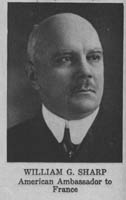 The other major obstacle was the sheer physical challenge created by the scope of the POW situation in France and
the government's labor policy. Hibbard quickly recognized the problems that the American embassy staff encountered
in administering to the needs of hundreds of thousands of Central Power war prisoners. The Ministry of War had
established approximately ninety major prison camps across the country to house about four hundred thousand Central Powers POWs by
the end of the war. In addition, the French military maintained four prison camps on Corsica, and twenty-seven prison
camps in North Africa (three in Tunisia, thirteen in Algeria, and eleven in French Morocco). The YMCA would need a large
body of field secretaries to visit and organize Association programs in French prison camps. To compound the problem of
the size of the prison population, the French employed their prisoner rank and file in labor detachments that scattered
prisoners across the country. Instead of concentrating a large number of POWs in a small number of camps, prisoners worked
in large numbers of work parties that moved according to the seasons or construction schedules. While the German
government agreed to the construction of YMCA huts in several prison camps, Association leaders in France considered
the acquisition of such halls as less practical.33
The other major obstacle was the sheer physical challenge created by the scope of the POW situation in France and
the government's labor policy. Hibbard quickly recognized the problems that the American embassy staff encountered
in administering to the needs of hundreds of thousands of Central Power war prisoners. The Ministry of War had
established approximately ninety major prison camps across the country to house about four hundred thousand Central Powers POWs by
the end of the war. In addition, the French military maintained four prison camps on Corsica, and twenty-seven prison
camps in North Africa (three in Tunisia, thirteen in Algeria, and eleven in French Morocco). The YMCA would need a large
body of field secretaries to visit and organize Association programs in French prison camps. To compound the problem of
the size of the prison population, the French employed their prisoner rank and file in labor detachments that scattered
prisoners across the country. Instead of concentrating a large number of POWs in a small number of camps, prisoners worked
in large numbers of work parties that moved according to the seasons or construction schedules. While the German
government agreed to the construction of YMCA huts in several prison camps, Association leaders in France considered
the acquisition of such halls as less practical.33
31
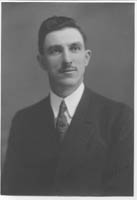 Although Hibbard and Gottsched provided the Ministry of War with statements in April 1915 regarding Harte's program
in Germany and the work of the American YMCA in England, the French government remained recalcitrant. Ambassador
Sharp informed Hibbard on May 5 that the War Ministry had decided to adopt a policy similar to English POW policy,
permitting local prison camp commandants to decide whether they would open their camps to American secretaries. The
French government would not object to any social work conducted on behalf of German prisoners, and did not anticipate
any objections by prison commanders. After learning of German concessions regarding Association work, several commandants
agreed to permit French chaplains to begin YMCA work in their facilities.34
Although Hibbard and Gottsched provided the Ministry of War with statements in April 1915 regarding Harte's program
in Germany and the work of the American YMCA in England, the French government remained recalcitrant. Ambassador
Sharp informed Hibbard on May 5 that the War Ministry had decided to adopt a policy similar to English POW policy,
permitting local prison camp commandants to decide whether they would open their camps to American secretaries. The
French government would not object to any social work conducted on behalf of German prisoners, and did not anticipate
any objections by prison commanders. After learning of German concessions regarding Association work, several commandants
agreed to permit French chaplains to begin YMCA work in their facilities.34
32
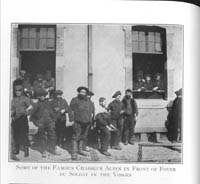 Hibbard continued to press the issue of prison camp access with the French government. Working through Dodge in
the U.S. Embassy, the American secretary hoped to salvage the situation. On 10 May 1915, Ambassador Sharp cabled
the International Committee that the Foreign Ministry supported Hibbard's request to distribute books and games to
German POWs, and expressed the desire of the Ministry of War to facilitate Association work and their appreciation
for its potential. While promising, this note did not result in a major improvement in the situation. Later in May,
Hibbard traveled to England and sailed back to New York during the summer to assume overall supervision of YMCA War
Prisoners' Aid (WPA) operations for the International Committee. He would serve as Senior Secretary responsible for
recruiting and assigning secretaries to WPA service, providing equipment and supplies, and forwarding funding. His
replacement was Darius Alton Davis, an experienced YMCA secretary.
Hibbard continued to press the issue of prison camp access with the French government. Working through Dodge in
the U.S. Embassy, the American secretary hoped to salvage the situation. On 10 May 1915, Ambassador Sharp cabled
the International Committee that the Foreign Ministry supported Hibbard's request to distribute books and games to
German POWs, and expressed the desire of the Ministry of War to facilitate Association work and their appreciation
for its potential. While promising, this note did not result in a major improvement in the situation. Later in May,
Hibbard traveled to England and sailed back to New York during the summer to assume overall supervision of YMCA War
Prisoners' Aid (WPA) operations for the International Committee. He would serve as Senior Secretary responsible for
recruiting and assigning secretaries to WPA service, providing equipment and supplies, and forwarding funding. His
replacement was Darius Alton Davis, an experienced YMCA secretary.
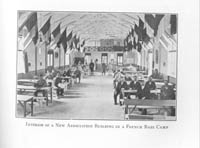 Some progress was achieved over the next few weeks, as Ministry of War officials indicated that the government was
preparing to grant the Association permission to begin POW service. Unable to work in prison camps, Davis developed
welfare programs for French soldiers. He focused on promoting Foyers du Soldat, huts where troops could enjoy
mental and spiritual diversions that helped boost military morale. French authorities remained suspicious of the
YMCA for several reasons. From a military perspective, neutral social welfare organizations represented a potential
espionage and security threat. French Catholics feared the dissemination of Protestant propaganda, while the French
Left opposed sectarian religious influence as represented by the American YMCA. French military commanders, however,
noted the value of the Association's service among their troops, engendering a greater degree of trust between Davis
and French officials.35
Some progress was achieved over the next few weeks, as Ministry of War officials indicated that the government was
preparing to grant the Association permission to begin POW service. Unable to work in prison camps, Davis developed
welfare programs for French soldiers. He focused on promoting Foyers du Soldat, huts where troops could enjoy
mental and spiritual diversions that helped boost military morale. French authorities remained suspicious of the
YMCA for several reasons. From a military perspective, neutral social welfare organizations represented a potential
espionage and security threat. French Catholics feared the dissemination of Protestant propaganda, while the French
Left opposed sectarian religious influence as represented by the American YMCA. French military commanders, however,
noted the value of the Association's service among their troops, engendering a greater degree of trust between Davis
and French officials.35
33
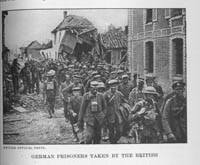 Davis' persistence and hard work, coupled with Harte's success in Germany, finally paid off. On 31 August 1915, the
Ministry of War granted official approval for American YMCA POW operations to begin in French military prison camps.
American Red Triangle workers could now provide services to Central Power prisoners to improve their welfare. Although
Davis wished to gain access to interned civilians in France, the Ministry of the Interior was not forthcoming, and these
unfortunate individuals remained outside the reach of the Association. Nor had the Ministry of War accepted the YMCA
without reservation. While Davis agreed that the construction of YMCA buildings in French prison camps was not cost-effective
due to French labor policies, the Germans demanded reciprocity, since they agreed to the construction of Red Triangle
buildings for French POWs in Germany. The building program became a thorny issue for Association diplomacy, and the first
"Y" would not be constructed in France until April 1916, at Carpiagne, near Marseilles.36
Davis' persistence and hard work, coupled with Harte's success in Germany, finally paid off. On 31 August 1915, the
Ministry of War granted official approval for American YMCA POW operations to begin in French military prison camps.
American Red Triangle workers could now provide services to Central Power prisoners to improve their welfare. Although
Davis wished to gain access to interned civilians in France, the Ministry of the Interior was not forthcoming, and these
unfortunate individuals remained outside the reach of the Association. Nor had the Ministry of War accepted the YMCA
without reservation. While Davis agreed that the construction of YMCA buildings in French prison camps was not cost-effective
due to French labor policies, the Germans demanded reciprocity, since they agreed to the construction of Red Triangle
buildings for French POWs in Germany. The building program became a thorny issue for Association diplomacy, and the first
"Y" would not be constructed in France until April 1916, at Carpiagne, near Marseilles.36
British Reluctance and POW Relief
34
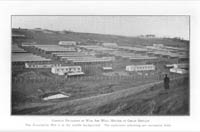 Despite Harte's achievements in Germany and Davis' eventual success in France, British authorities remained reluctant
to open their prisons to the American YMCA. In spite of the neutrality of the United States, the war had engendered
deep suspicions of foreign social welfare organizations in England. Sir Arthur Yapp, General Secretary of the English
National YMCA Council, was thoroughly convinced that the British government would not permit Swiss YMCA secretaries to
work in England under the jurisdiction of the World Committee in Geneva. Neutral Association secretaries would have to
be supervised by the English National Council for POW work to begin. In addition, British public opinion was inflamed
by reports of German cruelty to British POWs in Central Power prisons. English propaganda did little to alleviate these
perceptions, as the government strove to rally the masses behind the war effort. British authorities also pointed out
that several social welfare organizations had begun services for German POWs in England by the spring of 1915. The
Society of Friends (Quakers) formed the Friends' War Emergency Committee, which cared for the families of interned
civilians and promoted arts, handicrafts, and industrial work among the POWs. The Friends also conducted visitation
work and supervised social programs for interned civilians on the Isle of Man. Dr. K. E. Markel established the Prisoners
of War Relief Agency (Kriegsgefangenen Fürsorge) as another social welfare agency for German POWs. This
committee distributed clothing, tools, musical instruments, reading material, and general supplies to German POWs in
England. Dr. Markel also remitted money to prisoners from friends and family in Germany, and provided ambulance services
for POWs. This organization also provided a marketing distribution system through which prisoners could sell goods made
in prison camps for added income. In addition, the English YMCA had undertaken some preliminary work in British prisons
by setting up a hut, three marquees, and a social room in five prison camps by March 1915. But despite these projects,
the American YMCA persisted in its attempts to gain access to English prisons.37
Despite Harte's achievements in Germany and Davis' eventual success in France, British authorities remained reluctant
to open their prisons to the American YMCA. In spite of the neutrality of the United States, the war had engendered
deep suspicions of foreign social welfare organizations in England. Sir Arthur Yapp, General Secretary of the English
National YMCA Council, was thoroughly convinced that the British government would not permit Swiss YMCA secretaries to
work in England under the jurisdiction of the World Committee in Geneva. Neutral Association secretaries would have to
be supervised by the English National Council for POW work to begin. In addition, British public opinion was inflamed
by reports of German cruelty to British POWs in Central Power prisons. English propaganda did little to alleviate these
perceptions, as the government strove to rally the masses behind the war effort. British authorities also pointed out
that several social welfare organizations had begun services for German POWs in England by the spring of 1915. The
Society of Friends (Quakers) formed the Friends' War Emergency Committee, which cared for the families of interned
civilians and promoted arts, handicrafts, and industrial work among the POWs. The Friends also conducted visitation
work and supervised social programs for interned civilians on the Isle of Man. Dr. K. E. Markel established the Prisoners
of War Relief Agency (Kriegsgefangenen Fürsorge) as another social welfare agency for German POWs. This
committee distributed clothing, tools, musical instruments, reading material, and general supplies to German POWs in
England. Dr. Markel also remitted money to prisoners from friends and family in Germany, and provided ambulance services
for POWs. This organization also provided a marketing distribution system through which prisoners could sell goods made
in prison camps for added income. In addition, the English YMCA had undertaken some preliminary work in British prisons
by setting up a hut, three marquees, and a social room in five prison camps by March 1915. But despite these projects,
the American YMCA persisted in its attempts to gain access to English prisons.37
35 Even the English National Council had moved closer to the government's position. On 16 March 1915, Yapp felt that it was not necessary for an American secretary to accompany Porter on his visits to prison camps. The English Association decided that the construction of huts was not as important as organizing prisoners into committees to promote the social activities of the Association program. Harte's breakthrough in Berlin, which promised to benefit British prisoners in Germany, finally persuaded Yapp to support American YMCA aid in England. On March 29, after another meeting with Porter, Yapp asked the International Committee to send three American secretaries for POW work to England. One would work with Porter in northern England, another in the south, and the third would be assigned to the Isle of Man. The English General Secretary believed that Harte's diplomacy would prove decisive in changing the government's restrictive POW policy.38
36
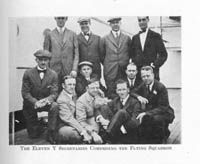 Ever ready to take advantage of an opportunity, the International Committee moved to expand operations in England.
On 12 May 1915, Mott sent $5,000 to London to finance POW services in Britain. To maintain American neutrality and
uphold the Principle of Reciprocity, Mott cabled $5,000 to Berlin to establish POW work in Germany. With this
financial base, the International Committee sent eleven experienced American secretaries to begin POW work in Europe.
They sailed from New York on July 3, ready to take on the tremendous challenges that faced them. They represented the
"Flying Squadron," the vanguard of American volunteers that would soon be streaming across the Atlantic. Some of
these original secretaries would work with British soldiers, while others would provide social services for German
POWs in England. After their arrival in Liverpool, the War Office finally relented and extended general permits for
the secretaries to begin work in English prison camps.39
Ever ready to take advantage of an opportunity, the International Committee moved to expand operations in England.
On 12 May 1915, Mott sent $5,000 to London to finance POW services in Britain. To maintain American neutrality and
uphold the Principle of Reciprocity, Mott cabled $5,000 to Berlin to establish POW work in Germany. With this
financial base, the International Committee sent eleven experienced American secretaries to begin POW work in Europe.
They sailed from New York on July 3, ready to take on the tremendous challenges that faced them. They represented the
"Flying Squadron," the vanguard of American volunteers that would soon be streaming across the Atlantic. Some of
these original secretaries would work with British soldiers, while others would provide social services for German
POWs in England. After their arrival in Liverpool, the War Office finally relented and extended general permits for
the secretaries to begin work in English prison camps.39
37
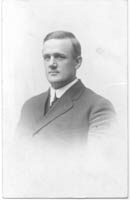 Hibbard remained in charge of the fledgling POW efforts in England through the summer of 1915. The International
Committee made an executive decision to divide up administrative responsibilities. Harte would focus on developing
Association work in Germany, Austria-Hungary, and Russia, conducting shuttle diplomacy between the imperial capitals
to extend American YMCA service. Mott ordered Hibbard to return to New York to assume responsibility for American
Association work for soldiers and POWs for the International Committee. Hibbard departed England in August 1915 to
take over funding and recruitment operations to support POW relief operations. He was replaced by a member of the
Flying Squadron, Robert L. Ewing. As a result of this transfer, Ewing became the Senior Secretary responsible for
POW services in the British Isles. The English General Secretary had a high opinion of Ewing: "Ewing has a splendid
grasp of the situation as far as the prisoner of war work is concerned, and under his leadership there is not the
slightest doubt it is going to be a power."40 These English
concessions towards the American YMCA laid the ground-work for POW relief work in Britain. British POW needs in
Central Europe and the Principle of Reciprocity ensured that the American YMCA would be able to begin relief work in
Western Europe. The next contentious issue was the expansion of Association POW relief into Eastern
Europe.41
Hibbard remained in charge of the fledgling POW efforts in England through the summer of 1915. The International
Committee made an executive decision to divide up administrative responsibilities. Harte would focus on developing
Association work in Germany, Austria-Hungary, and Russia, conducting shuttle diplomacy between the imperial capitals
to extend American YMCA service. Mott ordered Hibbard to return to New York to assume responsibility for American
Association work for soldiers and POWs for the International Committee. Hibbard departed England in August 1915 to
take over funding and recruitment operations to support POW relief operations. He was replaced by a member of the
Flying Squadron, Robert L. Ewing. As a result of this transfer, Ewing became the Senior Secretary responsible for
POW services in the British Isles. The English General Secretary had a high opinion of Ewing: "Ewing has a splendid
grasp of the situation as far as the prisoner of war work is concerned, and under his leadership there is not the
slightest doubt it is going to be a power."40 These English
concessions towards the American YMCA laid the ground-work for POW relief work in Britain. British POW needs in
Central Europe and the Principle of Reciprocity ensured that the American YMCA would be able to begin relief work in
Western Europe. The next contentious issue was the expansion of Association POW relief into Eastern
Europe.41
Notes:
Note 1: Harte served in the 2nd Alabama U.S.V. Infantry during the Spanish-American War, and had directed Red Triangle operations in India, Ceylon, and Burma for seven years. Their military experience and extensive YMCA service overseas made Harte and Hibbard ideal candidates to lead the American YMCA POW mission to Europe. Archibald C. Harte and Carlisle V. Hibbard Files, Biography A Box, Kautz Family YMCA Archives, University of Minnesota Libraries, Minneapolis, MN; "Memorandum to Mr. Henroid," circa June 1918, 2-3. World's Alliance Box X391: "War Work YMCA, 1914-1918: World's Committee, Geneva." Folder: "War Prisoners' Aid YMCA—Lists of Secretaries/Instructions for Secretaries, 1914-1918." World's Alliance of YMCAs Archives, Geneva, Switzerland; Executive of the World's Committee of YMCAs, "World's Committee of Young Men's Christian Associations, Plenary Meeting of 1920 at Geneva: Report of the Executive for the Period July 1914 to June 1920," The Sphere 2:3 (1921): 195; Conrad Hoffman, Jr., In the Prison Camps of Germany: A Narrative of "Y" Service among Prisoners of War (New York: Association Press, 1920), 1; and Kenneth Scott Latourette, World Service: A History of the Foreign Work and World Service of the Young Men's Christian Associations of the United States and Canada (New York: Association Press, 1957), 109. back
Note 2: Carlisle V. Hibbard, "Report of the Secretary Appointed to France for First Quarter of 1915," For the Millions of Men Now Under Arms 1 (24 June 1915): 26-28; Olin D. Wannamaker, For the Six Million Prisoners: The Welfare Work of the YMCA in the Prison Camps of Ten Nations during World War I (Unpublished manuscript, 1921), 23-24. Armed Services Records Box 53. Folder: "Prisoner of War Report-Olin D. Wannamaker-1921." Kautz Family YMCA Archives, University of Minnesota Libraries, Minneapolis, MN; and Hoffman, In the Prison Camps of Germany, 1. back
Note 3: Before the war began, Porter served as the YMCA Visiting Secretary to His Majesty prisons in England to extend Association services to the prison population. Invitation to F. L. Porter from the Commander of the Stratford, East Prison, 27 January 1915, 1. Major F. S. Picot, Commandant POW Camp, Frith Hill, 3 November 1914, 1. F. L. Porter, "Programme of Formal Opening of Recreation Tent for Soldiers of the Guard, Prisoners of War Camp, Frith Hill, Frimley, Tuesday, June 29th, 1915," 29 June 1915, Frith Hill, 1-4. "Concert of the Soldiers of the Guard," 7 July 1915, Frith Hill, Frimley, 1-3. Armed Services Records Box AS-20. Box X673.6: "Reports, Clippings, Publications, 1915-1921. World War #1: Prisoners of War." Folder C: "Prisoners of War, YMCA Work for England." Kautz Family YMCA Archives, University of Minnesota Libraries, Minneapolis, MN. back
Note 4: National Council of the YMCA [England], War Prisoners' Department Minutes, 1915-1918, 15 July 1915, 5. Armed Services Records Box AS-19. Kautz Family YMCA Archives, University of Minnesota Libraries, Minneapolis, MN; and Archibald C. Harte, "War Prisoners' Aid," 12 July 1918. John R. Mott Papers, Box 38, Folder 702, Yale School of Divinity, New Haven, CT. back
Note 5: William Howard Taft, Frederick Harris, Frederic Houston Kent, and William J. Newlin, eds., Service with Fighting Men: An Account of the Work of the American Young Men's Christian Association in the World War, 2 vols. (New York: Association Press, 1922), 2:246; Carlisle V. Hibbard, "Association Men in Prison Camps of Europe, " Association Men 41 (October 1915): 19; and Wannamaker, Six Million, 29. back
Note 6: Under international agreements, the U.S. government, as a neutral power, looked after German interests in Great Britain once England and Germany went to war. This included the inspection of prison camps and the care of German POWs in the British Isles. Archibald C. Harte, "War Prisoner's Aid," 12 July 1918, John R. Mott Papers, Box 38, Folder 702. Yale School of Divinity Archives, New Haven, CT. back
Note 7: Arthur Yapp, "From the Secretary General of the English National Council, London, April 22, 1915," For the Millions of Men Now Under Arms 1 (24 June 1915), 25-26; and Wannamaker, Six Million, 38-39. back
Note 8: The civilian internment camp was probably at Niort in the Department of Deux-Sevres (although Nantes in Loire-Inferieure was a possibility). The French censors permitted only the first letter of the camp's name to pass through the mails, and the prison camp at Niort was the closest to Namblard's post at Rochefort. J. Namblard, "Statement of Work, November-December, 1914, by Mr. J. Namblard, Secretary of the Western Group of the YMCAs in France," circa December 1914, 1-2. Armed Services Records Box AS-20. Box 673.6: "Reports, Clippings, Publications, 1915-1921: World War #1: Prisoners of War." Folder B: "Prisoners of War, YMCA Work for France." Kautz Family YMCA Archives, University of Minnesota Libraries,, Minneapolis, MN; "France: Report of the French Secretary in the West of France, November and December 1914," For the Millions of Men Now Under Arms 1 (1 March 1915): 11-12; and J. W. Namblard, "Report of Mr. J. W. Namblard in France for March 1915," For the Millions of Men Now Under Arms 1 (24 June 1915): 37. back
Note 9: Hibbard requested that the International Committee dispatch two secretaries immediately. They were probably Darius Alton Davis and Barton. Their identities were deleted by censors, who allowed only the first letter of their last names to be published. Biography A Box, Archibald C. Harte and Carlisle V. Hibbard Files, Kautz Family YMCA Archives, University of Minnesota Libraries,, Minneapolis, MN; William Graves Sharp, The War Memoirs of William Graves Sharp: American Ambassador to France, 1914-1919 (London: Constable and Company, 1931), 86-87; Carlisle V. Hibbard to Archibald C. Harte, 23 February 1915, 1. World's Alliance Box X391.2: "War Prisoners' Aid YMCA, 1914-1918; POW Camps in Germany and France; War Guilt Question." Section: "France (44)." Folder: "War Prisoners' Aid in France." World's Alliance of YMCAs Archives, Geneva, Switzerland; Carlisle V. Hibbard, "Cable from Our Secretary in Paris, March 27, 1915," For the Millions of Men Now Under Arms 1 (12 April 1915): 10; "Geneva, April 22, 1915," For the Millions of Men Now Under Arms 1 (24 June 1915): 34; "France: Report of Secretary Appointed to France for First Quarter 1915 (Cont.), Paris, April 13, 1915," For the Millions of Men Now Under Arms 1 (24 June 1915): 30; and Wannamaker, Six Million, 35. back
Note 10: Archibald C. Harte, "Germany: From Our Secretary in Germany," For the Millions of Men Now Under Arms 1 (24 June 1915): 5; Archibald C. Harte, "From Our Secretary in Germany, Berlin, March 4, 1915," For the Millions of Men Now Under Arms 1 (24 June 1915): 7; Archibald C. Harte, "Report by Our Secretary in Germany, Berlin, March 6, 1915," For the Millions of Men Now Under Arms 1 (24 June 1915): 8; Hoffman, In the Prison Camps of Germany, 17; "Memorandum to Mr. Henroid," circa June 1918, 3. World's Alliance Box X391: "War Work YMCA, 1914-1918: World's Committee, Geneva." Folder: "War Prisoners' Aid YMCA—Lists of Secretaries/Instructions for Secretaries, 1914-1918." World's Alliance of YMCAs Archives, Geneva, Switzerland; International Committee of Young Men's Christian Associations, "Summary of Minutes of Regular Monthly Meetings of the International Committee of the Young Men's Christian Associations, November 11, 1915, New York City," 5. International Committee, Monthly Meeting Minutes, 1909-1916. Kautz Family YMCA Archives, University of Minnesota Libraries, Minneapolis , MN; and Wannamaker, Six Million, 34-35. back
Note 11: Archibald C. Harte, "Germany: From Our Secretary in Germany, Berlin, March 13, 1915, " For the Millions of Men Now Under Arms 1 (24 June 1915), 5-6; Hugo Hidman, Deutsche evangelische Gefangen-Seelsorge im Weltkrieg: Tätigseits Bericht des Hilfs-Ausschuffes für Gefangenen-Seelsorge (Leipzig: Verlag von Dërffling und Frante, 1921), 1-109. Charles Correvon, Aus deutschen Kriegsgefangene-Lagern: Dritte Folge; Eindrücke eines Seelsorgers (Frankfurt am Main, Germany: Literarische Anstalt Rütten und Lëning, 1916), 1-45. Badhus, Die Kriegsgefangenen in Deutschland: Gegen 250 Wirtlichkeitsaufnahmen aus deutschen Gefangenenlagern (Siegen: Verlag Hermann Montanus, 1916), 1-112. Armed Services Records Box AS-49: "German Publications, Circa 1918 (Prisoner of War Work). Kautz Family YMCA Archives, University of Minnesota Libraries, Minneapolis, MN; Wannamaker, Six Million, 34-35; James W. Gerard, My Four Years in Germany (New York: George H. Doran Company, 1917), 300-01; and Taft, Harris, Kent, and Newlin, Service with Fighting Men, 2:293. back
Note 12: Wannamaker, Six Million, 39. back
Note 13: Archibald C. Harte, "Cable from Secretary in Berlin, March 14, 1915," For the Millions of Men Now Under Arms 1 (12 April 1915), 15; Archibald C. Harte, "Germany: From Our Secretary in Germany, Berlin, March 13, 1915," For the Millions of Men Now Under Arms 1 (24 June 1915), 6; "For Prisoners of War," For the Millions of Men Now Under Arms 1 (31 July 1916): 44; "Memorandum to Mr. Henroid, " circa June 1918, 3. World's Alliance Box X391: "War Work YMCA, 1914-1918: World's Committee, Geneva. " Folder: "War Prisoners' Aid YMCA—Lists of Secretaries/Instructions for Secretaries, 1914-1918." World's Alliance of YMCAs Archives, Geneva, Switzerland; Executive of the World's Committee of YMCAs, "World's Committee of Young Men's Christian Associations, Plenary Meeting of 1920 at Geneva: Report of the Executive for the Period July 1914 to June 1920," The Sphere 2:3 (1921): 195; "Prisoners of War," No Date, pp. g-h. Raymond E. Swing, "International War Prison Work by American Y.M.C.A. Gains Start in Germany," New York Daily News (30 October 1915), 5. "Y.M.C.A. to Aid Captives: Germany Has Authorized Organization to Establish Prison Branches," Kansas City Star (13 March 1915). Armed Services Records Box AS-20. Box X673.6: "Reports, Clippings, Publications, 1915-1921: World War #1: Prisoners of War." Folder E: "Prisoners of War, YMCA Work for Germany." Kautz Family YMCA Archives, University of Minnesota Libraries, Minneapolis, MN; Wannamaker, Six Million, 38-39; and Taft, Harris, Kent, and Newlin, Service with Fighting Men, 2:293. back
Note 14: "From a Secretary of the Swiss Student Federation Visiting in Germany, February 2, 1915," For the Millions of Men Now Under Arms 1 (12 April 1915): 14-15; "From a Professor in the University of Berlin," For the Millions of Men Now Under Arms 1 (12 April 1915): 15; and Archibald C. Harte, "From Our Secretary in Germany, Berlin, March 4, 1915," For the Millions of Men Now Under Arms 1 (24 June 1915), 7. back
Note 15: British subjects from the Dominions followed the first wave of English internees as their respective countries interned German civilians. The Germans allowed Dominion subjects to keep their freedom as long as Germans remained at large in the respective Dominion states. As a result, the Germans imprisoned Australian subjects in March 1915 after the parliament in Canberra decided to detain Central Power subjects. Archibald C. Harte, "From the Secretary in Berlin, February 22, 1915," For the Millions of Men Now Under Arms 1 (12 April 1915): 14; Archibald C. Harte, "From Our Secretary in Germany, Berlin, March 4, 1915," For the Millions of Men Now Under Arms 1 (24 June 1915): 7; Archibald C. Harte, "Report by Our Secretary in Germany, Berlin, March 6, 1915," For the Millions of Men Now Under Arms 1 (24 June 1915): 8; Christian Phildius, "From the Secretary of the World's Committee Working in Germany, April 1, 1915," For the Millions of Men Now Under Arms 1 (24 June 1915): 20; A. D. McLaren, "Berlin and Ruhleben during the War," Contemporary Review 109 (February 1916): 219-20; and Taft, Harris, Kent, and Newlin, Service with Fighting Men, 2:296-97. back
Note 16: Archibald C. Harte, "Report by Our Secretary in Germany, Berlin, March 6, 1915, " For the Millions of Men Now Under Arms 1 (24 June 1915): 8; "From the Correspondence of the German Student Movement," For the Millions of Men Now Under Arms 1 (24 June 1915): 19; "Report from the Secretary of the German Student Movement, Berlin," For the Millions of Men Now Under Arms 1 (15 September 1915): 15-16; "How Work for Soldiers Is Administered," No Date, pp. f-g. Armed Services Records Box AS-20. Box X673.6: "Reports, Clippings, Publications, 1915-1921: World War #1: Prisoners of War." Folder E: "Prisoners of War, YMCA Work for Germany." Kautz Family YMCA Archives, University of Minnesota Libraries, Minneapolis, MN; and Wannamaker, Six Million, 47 and 86. back
Note 17: Archibald C. Harte, "From the Secretary in Berlin, Germany, February 22, 1915, " For the Millions of Men Now Under Arms 1 (12 April 1915): 13-14. back
Note 18: Archibald C. Harte, "From the Secretary in Berlin, Germany, February 22, 1915, " For the Millions of Men Now Under Arms 1 (12 April 1915): 14; Archibald C. Harte, "Germany: From Our Secretary in Germany, Berlin, March 13, 1915," For the Millions of Men Now Under Arms 1 (24 June 1915): 6; "The Million Testament Call," Philadelphia Sunday School Times (10 July 1915). Armed Services Box X673.6: "Reports, Clippings, Publications, 1915-1921: World War #1: Prisoners of War." Folder E: "Prisoners of War, YMCA Work for Germany." Kautz Family YMCA Archives, University of Minnesota Libraries, Minneapolis, MN; and Wannamaker, Six Million, 35. back
Note 19: Archibald C. Harte, "Cable from the Secretary in Berlin, March 16, 1915," For the Millions of Men Now Under Arms 1 (12 April 1915): 15; Archibald C. Harte, "The First War Prison Building for the Young Men's Christian Association, Gëttingen, Germany," For the Millions of Men Now Under Arms 1 (24 June 1915): 17; "Memorandum for Mr. Henroid," circa June 1918, 3. World's Alliance Box X391: "War Work YMCA, 1914-1918: World's Committee, Geneva." Folder: "War Prisoners' Aid YMCA—Lists of Secretaries/Instructions for Secretaries, 1914-1918." World's Alliance of YMCAs Archives, Geneva, Switzerland; and Wannamaker, Six Million, 39-40. back
Note 20: Harte, "Germany: From Our Secretary in Germany, Berlin, March 13, 1915," 6; Von Lübbers, "War Ministry to Mr. Christian Phildius, Berlin, March 18, 1915," For the Millions of Men Now Under Arms 1 (24 June 1915), 9; Harte, "From Our Secretary in Prison Camps in Germany, March 30, 1915," 10-11; Harte, "Report of the Work at Göttingen, Germany, March 30, 1915," For the Millions of Men Now Under Arms 1 (24 June 1915): 14; Harte, "The First War Prison Building for the Young Men's Christian Association, Göttingen, Germany," 17; Bogen, "The Opening of the Association Building at Gëttingen: Speech by Colonel Bogen, the Commandant," For the Millions of Men Now Under Arms 1 (6 December 1915): 46; Christian Phildius, 24 March 1915, Geneva, Switzerland, 1-4. World's Alliance Box X391.2: "War Prisoners' Aid YMCA, 1914-1915; POW Camps in Germany and France; War Guilt Question." Section 43: "Germany." Folder: "War Prisoners' Aid in Germany: Miscellaneous." World's Alliance of YMCAs Archives, Geneva, Switzerland; and Wannamaker, Six Million, 49-50. back
Note 21: Harte, "From Our Secretary in Prison Camps in Germany, March 30, 1915," 11-12; James W. Gerard, "Embassy of the United States of America, Germany, Berlin, April 10, 1915," For the Millions of Men Now Under Arms 1 (24 June 1915): 15; and Christian Phildius, 24 March 1915, Geneva, Switzerland, 1-4. World's Alliance Box X391.2: "War Prisoners' Aid YMCA, 1914-1915; POW Camps in Germany and France; War Guilt Question. " Section 43: "Germany." Folder: "War Prisoners' Aid in Germany: Miscellaneous." World's Alliance of YMCAs Archives, Geneva, Switzerland. back
Note 22: Wannamaker, Six Million, 50. back
Note 23: Christian Phildius to Dr. Wölfing, 7 April 1915, Geneva, Switzerland, 1-2. World's Alliance Box X391.2: "War Prisoners' Aid YMCA, 1914-1915; POW Camps in Germany and France; War Guilt Question." Section 43: "Germany." Folder: "War Prisoners' Aid in Germany: Miscellaneous." World's Alliance of YMCA Archives, Geneva, Switzerland; Raymond E. Swing, "International War Prison Work by American Y.M.C.A. Gains Start in Germany," New York Daily News (30 October 1915), 5. Box X673.6: "Reports, Clippings, Publications, 1915-1921: World War #1: Prisoners of War." Folder E: "Prisoners of War, YMCA Work for Germany." Kautz Family YMCA Archives, University of Minnesota Libraries, Minneapolis, MN; and Wannamaker, Six Million, 50. back
Note 24: Harte, "From Our Secretary in Germany, Berlin, March 29, 1915," 9. back
Note 25: Harte, "From Our Secretary in Germany, Berlin, March 29, 1915," 9; and H.G. Gilliland, My German Prisons: Being the Experiences of an Officer during Two and a Half Years as a Prisoner of War (London: Hodder and Stoughton, 1918), 32-62. back
Note 26: Harte, "Report by Our Secretary in Germany, Berlin, March 6, 1915," 7-8; "From Sergeant McGuinn, Royal Fusiliers, Cassel, April 13, 1915," For the Millions of Men Now Under Arms 1 (24 June 1915): 19; and Wannamaker, Six Million, 51 and 57. back
Note 27: The typhoid epidemic at Wittenberg was almost under control at this time and, as mentioned earlier, the Germans had greatly improved their sanitation procedures in POW camps to prevent similar outbreaks. Of the total number of prisoners, the Germans held 5,140 Russian officers and 504,210 Russian soldiers. Harte, "Germany: From Our Secretary in Germany, Berlin, March 13, 1915," 6; Gerard, "Embassy of the United States of America, Germany, Berlin, April 10, 1915," 15; J. Scott Keltie and M. Epstein, The Statesman's Year-Book: Statistical and Historical Annual of the States of the World for the Year 1915 (London: Macmillan and Company, 1915), 941; Swing, "International War Prison Work by American Y.M.C.A. Gains Start in Germany," 5. Box X673.6: "Reports, Clippings, Publications, 1915-1921: World War #1: Prisoners of War." Folder E: "Prisoners of War, YMCA Work for Germany." Kautz Family YMCA Archives, University of Minnesota Libraries, Minneapolis, MN; Wannamaker, Six Million, 51-52; and Speed, Prisoners, 78. back
Note 28: Harte, "Germany: From Our Secretary in Germany, Berlin, March 13, 1915," 6. John R. Mott to Christian Phildius, 24 July 1915, New York, 1. World's Alliance Box X391.2: "War Prisoners' Aid YMCA, 1914-1915; POW Camps in Germany and France; War Guilt Question." Section 43: "Germany." Folder: "War Prisoners' Aid in Germany: Miscellaneous." World's Alliance of YMCAs Archives, Geneva, Switzerland. back
Note 29: Carlisle V. Hibbard, "Extracts from a Letter from Our Secretary in Paris, February 10, 1915," For the Millions of Men Now Under Arms 1 (12 April 1915), 9. back
Note 30: "France: Report of Secretary Appointed to France for First Quarter 1915 (Cont.), Paris, April 13, 1915," For the Millions of Men Now Under Arms 1 (24 June 1915), 30; Carlisle V. Hibbard, "Reports of Our Secretary in France, Paris, March 17, 1915," For the Millions of Men Now Under Arms 1 (24 June 1915), 30-32; and Christian Phildius, "Geneva, April 22, 1915," For the Millions of Men Now Under Arms 1 (24 June 1915), 34. back
Note 31: "France: Report of Secretary Appointed to France for First Quarter 1915 (Cont.), Paris, April 13, 1915," For the Millions of Men Now Under Arms 1 (24 June 1915): 30. back
Note 32: Ibid.; Christian Phildius, "Geneva, April 22, 1915," For the Millions of Men Now Under Arms 1 (24 June 1915), 34; and Taft, Harris, Kent, and Newlin, Service with Fighting Men, 2:262. back
Note 33: The French closed the prison camps for German POW's during the summer of 1916. After members of the Russian Legion fighting on the Western Front mutinied, the French sent a large number of Russian POW's to captivity in North Africa. "France: Military Work in France: By a Secretary, Geneva, February 1, 1915, " For the Millions of Men Now Under Arms 1 (12 April 1915), 5-6; Phildius, "Geneva, April 22, 1915," 34; Hamburgischen Landsverein von Roten Kreuz, Karte der französischen Gefangenenlader und hauptsächlichsten Hospitäler (Lazerette) (Hamburg: L. Friedrichsen Co., 1915), 1. World's Alliance Box X391.2: "War Prisoners' Aid YMCA, 1914-1918; POW Camps in Germany and France; War Guilt Question." Section: "France (44)." Folder: "War Prisoners' Aid in France." World's Alliance of YMCAs Archives, Geneva, Switzerland; Sharp, War Memoirs, 70; and Speed, Prisoners, 81-82. back
Note 34: Wannamaker, Six Million, 43-45. back
Note 35: Davis had served in Constantinople as Senior Secretary beginning in 1911 and had gained war work experience during the Balkan Wars. Davis' support for the Foyers du Soldat program deviated from the Wilson Administration's "spirit of neutrality," since this relief work aided the French war effort. But Davis was desperate to prove to French authorities that the Association program was beneficial, morally and spiritually, and conducted as a Christian mission. Phildius, "Geneva, April 22, 1915," 34; "Report of Secretary Appointed to France for First Quarter 1915 (Cont.), Paris, April 13, 1915," 29-30; Darius Alton Davis File, Biography A Box, Kautz Family YMCA Archives, University of Minnesota Libraries, Minneapolis, MN; Wannamaker, Six Million, 62-65; and Thomas Marye Sharp, "Cable from the American Ambassador at Paris through the Secretary of State, Washington, May 10, 1915," For the Millions of Men Now Under Arms 1 (24 June 1915), 36. back
Note 36: Darius A. Davis, "France: Report of Secretary Appointed to France for First Quarter 1915 (Cont.), Paris, April 13, 1915," For the Millions of Men Now Under Arms 1 (24 June 1915): 29-30; and Darius A. Davis, "For Prisoners of War," For the Millions of Men Now Under Arms 1 (31 July 1916): 31-32. back
Note 37: K. E. Markel, Fröhliche Weihnachten 1917 (London: Minister and Company, 1917), 1-16. Armed Services Records Box AS-49: "German Publications, Circa 1918 (Prisoner of War Work); "Memo Regarding Y.M.C.A. Work in Prisoners of War Camps in England, and Other Parts of the British Empire," circa 1915, 1-4. World's Alliance Box X392.2 "War Prisoners' Aid Y.M.C.A., 1914-1918: Russian P.O.W.s in Germany, 1920-1921; War Prisoners' Aid in Turkey, Great Britain, Italy." Folder: X391.2 (42): "War Prisoners' Aid, Y.M.C.A. in Great Britain." World's Alliance of YMCAs Archives, Geneva, Switzerland; Wannamaker, Six Million, 33, 43, and 55; and Taft, Harris, Kent, and Newlin, Service with Fighting Men, 2:246. back
Note 38: Arthur Yapp, "From the Secretary General of the English National Council, London, April 22, 1915," For the Millions of Men Now Under Arms 1 (24 June 1915): 25-26; Taft, Harris, Kent, and Newlin, Service with Fighting Men, 2:245-46; and Wannamaker, Six Million, 46-47. back
Note 39: Of these eleven American secretaries, only three (Conrad Hoffman, H. R. Gold, and James Sprunger) spoke German, although they were assigned to conduct welfare operations with Central Power POWs. Hoffman, In the Prison Camps of Germany, 1-4; Carlisle V. Hibbard, "Association Men in Prison Camps of Europe," Association Men 41 (October 1915): 20; and Taft, Harris, Kent, and Newlin, Service with Fighting Men, 2:245. back
Note 40: Wannamaker, Six Million, 73. back
Note 41: Folder: "Carlisle V. Hibbard." International Division Biography Box A. Kautz Family YMCA Archives, University of Minnesota Libraries, Minneapolis, MN; Hibbard, "Association Men in Prison Camps in Europe," 20; and Taft, Harris, Kent, and Newlin, Service with Fighting Men, 2:246. back